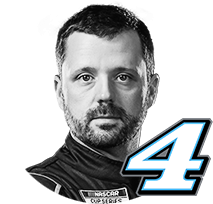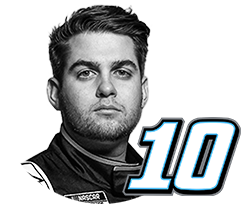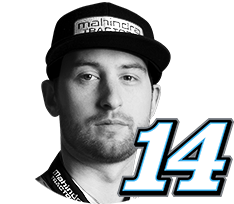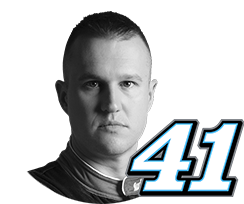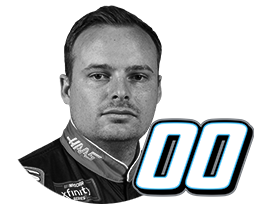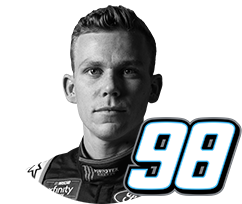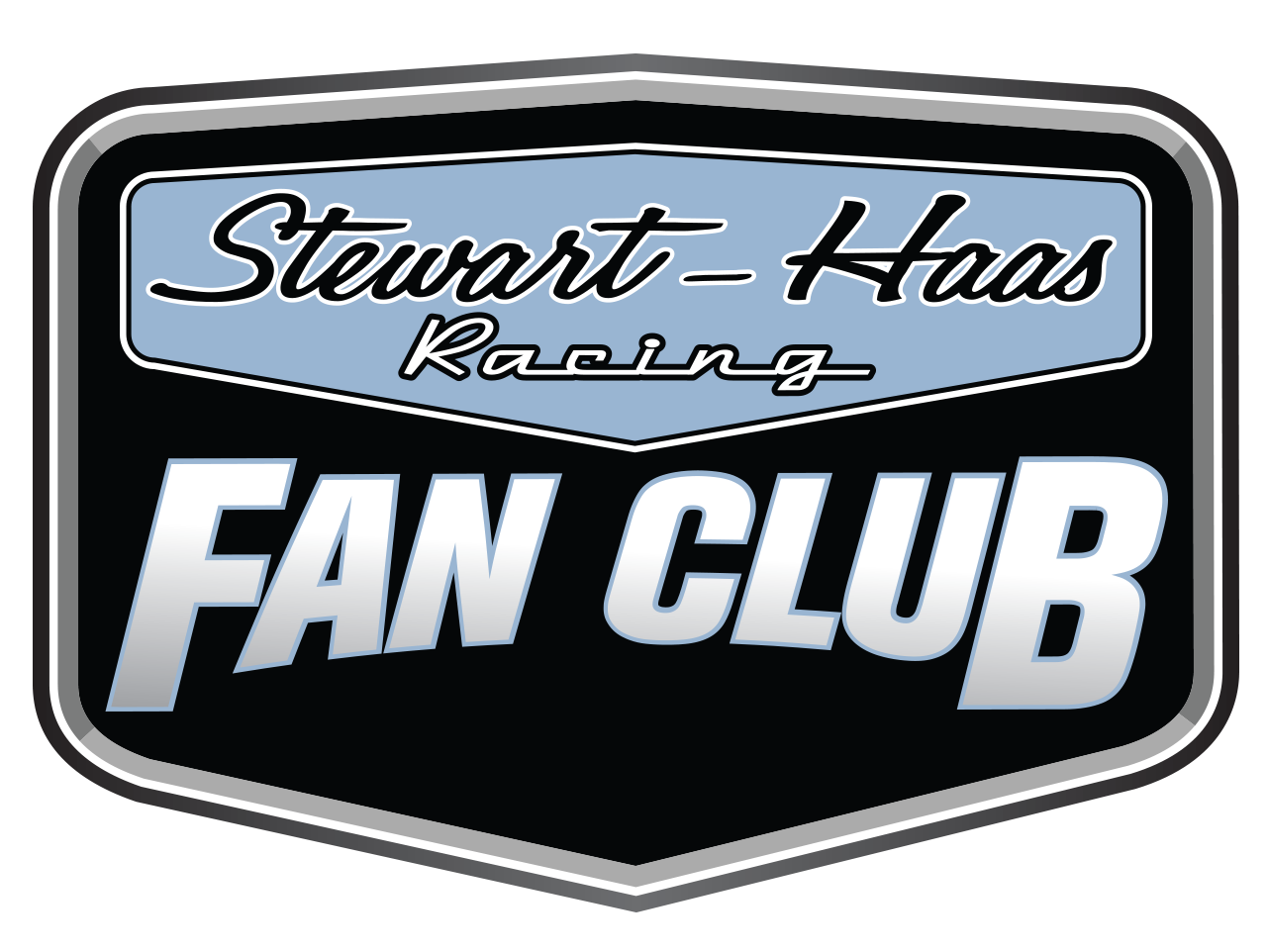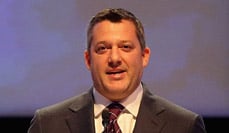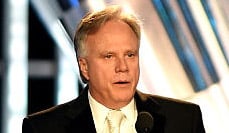When Michael Jordan played in any NBA game, everyone in the arena knew he could dominate at any time. Which is why Jordan is considered one of – if not the – best ever.
Kevin Harvick has only two Monster Energy NASCAR Cup Series wins at Atlanta Motor Speedway, site of Sunday’s Folds of Honor 500, but has dominated there since 2008 with 11 top-10 finishes in 14 races. He’s led a series-high 1,152 laps and is coming off an impressive victory last year when he started third and led 181 laps along the way.
Harvick has led 100 laps in every Atlanta Cup Series race since 2014 and has also won four of his last six NASCAR Xfinity Series races at the 1.54-mile oval. He will not race in Saturday’s Xfinity Series race but will be the lead driver analyst for the television broadcast on FS1.
Atlanta has always been a special place for Harvick as he scored his first career Cup Series victory there in 2001. Following Dale Earnhardt’s death on the final lap of that year’s Daytona 500, Harvick was named the driver of the No. 29 Chevrolet for Richard Childress Racing and made his series debut the following weekend at Rockingham (N.C.) Speedway, where he finished 14th. On March 11, less than one month since his debut in NASCAR’s top series and in just his third start, Harvick won his first Cup Series race at Atlanta.
While Harvick will look to continue his Atlanta domination this weekend, the rules will be a bit different than in previous years.
NASCAR officials in October announced two baseline rules packages for the 2019 season, making a move to bolster competition with enhanced aerodynamic and engine configurations. The different packages are tailored to the specific tracks on the Cup Series circuit, with a combination of a smaller tapered spacer to reduce engine horsepower to a target goal of 550 – from 750 – and aero ducts to foster tighter racing on a majority of speedways measuring longer than 1 mile. Both features are in place for 17 of the 36 races, the lone exception being last week’s Daytona 500, which ran with traditional restrictor-plate rules. Five races, including Atlanta, will be run with the smaller spacer, but without ducts.
Harvick heads into Atlanta 14th in points after a disappointing 26th-place finish in the Daytona 500. But he did score 10 points by winning the Gander RV Duel No. 1 last Thursday and scored six bonus points in Stages 1 and 2 Sunday’s Daytona 500.
Daytona was three races in nine days to get the season started. But now, the real season begins as there are 35 points-paying events left as Harvick goes for his second championship.
KEVIN HARVICK, Driver of the No. 4 Busch Beer Ford Mustang for Stewart-Haas Racing:
The new rules package starts at Atlanta this weekend. What can you do to prepare for this?
“Race. You know, race is really what you have to do to adjust to the package because you don’t really know how it’s going to race until you run a race. And Daytona is irrelevant to what we’re going to do in Atlanta. And, you know, as we go to Atlanta and start compiling that notebook in the very first practice and put the cars on the racetrack, obviously our history in Atlanta is pretty strong. And we know what we’re looking for in the racecar and how it should handle and so there’s the downforce-versus-drag conversation. How much downforce can you take out of the car and make the thing survive? How much handling will come into play? The restarts are going to be crazy. Are you going be able to get close enough to actually bump draft? Can you actually stay hooked together? There are just so many questions to answer that we don’t have any answers to other than theory. And, at this particular point, we just need to race to really start crossing things off the list and have a direction to know what we’re working on past, you know, the theory that we’ve put into everything to put on the track at the beginning of the year.”
The cream always rises to the top but how long do you think it’ll be before elite teams figure out this package and break away from the pack, literally and figuratively?
“It could happen in the very first race. I think as you look at the drastic change that we’ve had in horsepower and downforce and rules and all the different things that are coming into play here, we could very well go to the first two months of the season and one organization might have just an absolute, distinct advantage and win all the races. I mean, it’s literally possible and I think obviously last year we were kind of in that crowd and it’s just too big of a ship to turn around in a week. It’s just impossible from a manufacturing standpoint and cutting bodies off and knowing whether your theory’s right or wrong. It’s only answered when we get to the racetrack and every team’s going to have a little bit of a different approach to what they think is right and wrong. And, you know, I think the window’s wide open to take a period and have an organization absolutely dominate or be behind in the first two months of the season.”
You’re broadcasting on FOX and Sirius again this year. Talk about that.
“Well, I feel like it’s definitely – TV and radio are totally different, and I say that just because, fortunately being able to do both, I think to me they’re a totally different set of fans and how they pay attention to what you’re doing. The radio stuff I feel has given me a really great connection with the grassroots, hardcore fan. TV has been just talking to everybody in more general terms, I guess you could say, on a much more sporadic type of schedule. But it’s been really good practices for me to go through just because of the fact that the perspective is so much different than the competitor perspective and what you want to see and what you want to talk about. You want it to be more exciting and you want to have more stuff happen. And from a competitor standpoint, I just want to go out there and run them into the ground and hope that you beat them by two laps. So that’s not very exciting to watch but, from a competitor standpoint, that’s when you feel like you do your job. From a TV standpoint, it’s hard to keep talking about the guy who’s two laps ahead of everybody else and make a good story out of it, but there are always stories. Sometimes on TV you don’t have to really say anything because the screen tells the story. On the radio, you have to really put it in perspective for the fans, and on Sirius I feel like we’ve probably been one of the best things that I’ve ever done as far as that connection to the fans, because it’s so interactive. And if you’re tuning in to the NASCAR Channel, it’s a specific tune-in. It’s not, ‘I accidentally turned on the NASCAR channel.’ You’re listening for a reason and especially if you’ve tuned in to our show.”


